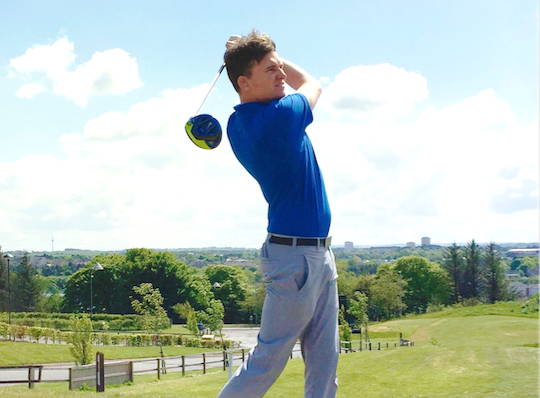Meet Team GB Deaflympics bronze medalist Steven Cafferty
Last updated:
Steven Cafferty edged out Emil Nielsen in a play-off to win the first ever bronze medal for golf at the Deaflympics, describing his feat as ‘a dream come true’
Steven Cafferty seems just like any other golf nut. Turn up at the Playsport complex in East Kilbride and you can bet he’ll be playing or talking golf. The latter he does for a living as a sales advisor at American Golf, though his real talent lies in hitting clubs rather than selling or fitting them. The 27-year-old plays off two at the Heritage Links course and finished fourth in the 2016 World Deaf Championship.
This week, Cafferty made history by being one of the first golfers to win a medal as golf was brought to the Deaflympics for the first time. Having been beaten in his semi-final, Cafferty’s bronze medal match went down to the wire as he eventually overcame Denmark’s Lasse Emil Nielsen on the first play-off hole.
“This really is a dream come true,” said Steven. “You only get out what you put into life and into your golf. All the practising and endless drills are worth every moment of how proud I felt to step up onto the podium and accept my medal.”
When we met him, he was gearing up to represent Team GB and told us all about his struggles and triumphs as a deaf golfer.
Q. How did you first get into golf? My dad got me involved when I was about seven or eight and took me for lessons at a local golf club [Craigie Hill]. Since then, I’ve always wanted a career in golf. I ended up being accepted into the PGA as the first deaf person to do so, but I had to delay my career as a professional. I moved to Nevada Bob’s from Noah’s Ark Golf Centre and then into American Golf.
Q. What’s been your biggest achievement? Winning the club championship at Milngavie GC and having my name up on the board in the clubhouse. Just seeing my name every day made me realise I did the right thing in not letting my deafness affect my ability, or my life. I’ve also won the World Deaf Golf Team Championships with Scotland, becoming the first European country to do so. I’m now a three-time Scottish Deaf Open champion.
Q. What were your experiences like growing up as a budding sportsperson with a disability? Sometimes it was lonely. I had a bad temper growing up in golf as I often wondered why I deserved a bad round because I was deaf. I blamed everything on my deafness, like it was bad luck. Then I grew up and realised being deaf doesn’t affect my mentality or my ability to hit a golf ball. Being selected to represent Team GB at the 2017 Deaflympics in Turkey was reward for my hard work and dedication to my game improvement.
Q. Did you find it hard to integrate yourself in team events and play with other golfers?
I often found myself isolated from other juniors. Even these days, I’m still missing out, but I’m trying harder to get more involved and, usually, the guys I play with are patient. The common stereotype of a deaf person is someone who can’t speak well, or hear at all. I talk as well as anybody and that can make people underestimate my deafness level, which is profound.
Q. What are you aiming to achieve by speaking out about your experiences? I hope I can show that by not letting deafness affect your life, you can still do what you want to do and be happy and positive. I am honest enough to say that there have been moments where I wanted to just give up, but that’s not my mentality. I kept going, and yes there are limits to what I can do, but it makes me appreciate the things I can do even more. If I need help, there is support in place with several deaf-supporting companies.
Q. Do you think golf needs to be more inclusive of sportspeople with disabilities?
With the amount of money being dished out on endorsements for pros these days, I’d like to see a bit more support for the disabled golfing community. I’m a fundraising of cancer for Scottish Deaf Golf and we may have to fold due to a lack of awareness and funding which is a shame. I’ve managed to raise over £6,000 in the last three or four years to help with the costs for international events, which can cost as much as £2,000 per golfer to represent their country.

